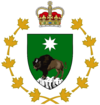Normudria: Difference between revisions
Aborzhenia (talk | contribs) No edit summary |
Aborzhenia (talk | contribs) No edit summary |
||
| Line 61: | Line 61: | ||
==History== | ==History== | ||
[[File:The_Burning_of_Cork_(9713428703).jpg|200px|thumb| | [[File:The_Burning_of_Cork_(9713428703).jpg|200px|thumb|Dáildrummoth during the Civil War, 1923.]] | ||
==Geography== | ==Geography== | ||
Revision as of 05:15, 28 September 2019
This article is incomplete because it is pending further input from participants, or it is a work-in-progress by one author. Please comment on this article's talk page to share your input, comments and questions. Note: To contribute to this article, you may need to seek help from the author(s) of this page. |
The Kingdom of Normudria Ríocht Normudra | |
|---|---|
| Motto: In memoriam, in spem | |
| Capital and largest city | Dáildrummoth |
| Official languages | High Normudric |
| Recognised national languages | Vulgar Normudric |
| Demonym(s) | Normudric |
| Government | Unitary constitutional monarchy |
• King | Sean IV |
• Prime Minister | Cáel Ó Gábháin |
| Legislature | Parliament |
| Council of Peers | |
| Council of Deputies | |
| Population | |
• 2019 estimate | 14,946,834 |
• 2015 census | 14,937,984 |
| Currency | Punt |
| Date format | dd-mm-yyyy |
Normudria, officially the Kingdom of Normudria, is a sovereign state in Anteria's Southern Hemisphere. A constitutional monarchy for nearly half a millennium, the nation's modern history has been marred by many conflicts both internal and external. Normudria's position upon a wealth of natural resources helped speed the industrialization of the country during the late 19th and early 20th centuries, but has acted in recent decades as a sort of resource curse that has a destabilizing effect on the already politically weakened Normudria.
History
Geography
Climate
Environment
Politics and Government
Normudria's government is derived from the 1878 Constitution, which grants the monarch extreme influence in the nation's policy. Prior to 1878, the Kingdom was governed as an absolute monarchy that claimed divine right to rule. Even after the Constitution was promulgated, though, it was seen as a gift from the Normudric nobility that could revoked at any time, and it was only after decades of pressure from liberals in the new Council of Deputies that the Constitution was eventually seen as the supreme law of the land.
Legislative Branch
While the lower house of Parliament (The Council of Deputies) is elected via a direct vote from the people, the Council of Peers' membership is appointed; members only come from those who have achieved the status of peerage from a Royal Decree. Any new laws must pass both Councils and be approved by the King or Queen, thus removing much of the power from the people in actual governance. This lack of direct input has often led to tension and conflict, and is cited as a frequent sticking point in recent Normudric history.
Executive Branch
The Prime Minister of Normudria is elected from within the Council of Deputies, but can only take office after personal approval from the King/Queen. After this accession, the Prime Minister may then appoint a new Government (or Cabinet) in consultation with the King/Queen to head the nation's Ministries:
- Civil Affairs
- Foreign Affairs
- Finance
- Justice
- Public Works
- Education
- Armed Forces
In addition, the three subordinate Department heads (Army, Navy and Air Service) are appointed by the Prime Minister in consultation with both the King or Queen and the advice of the Armed Forces Ministry. The Prime Minister, in addition to their duties as head of the Cabinet, also has several powers within Parliament such as the ability to end sessions of the Council of Deputies and call for snap elections. Confusingly, the monarch also has this power, though typically refrains from using it due to custom and potential political backlash. The ruling monarch in general has historically been prevented from direct interference in government affairs for fear of sparking popular unrest.


